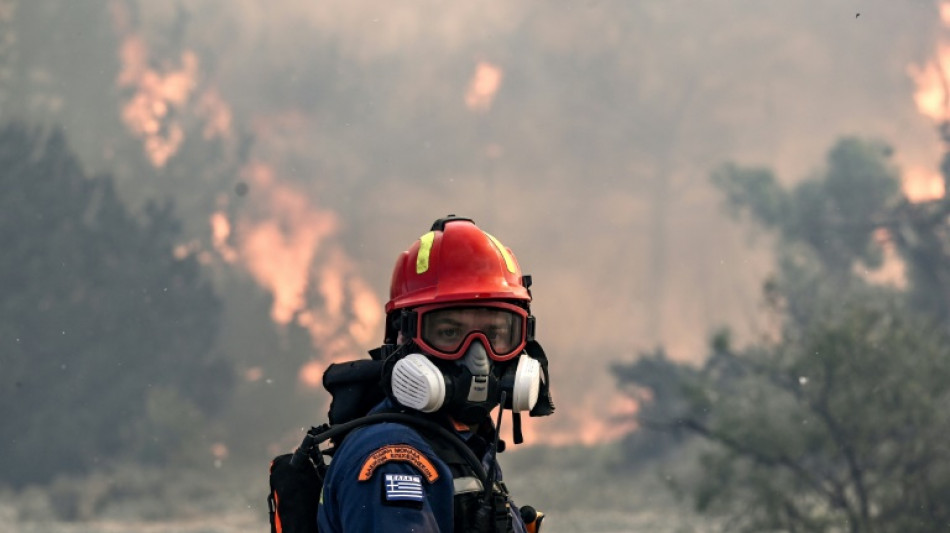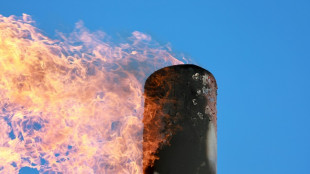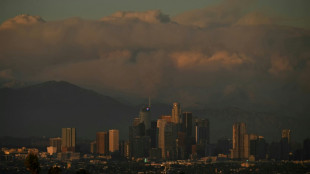
-
 Putin evokes WWII victory to rally Russia behind Ukraine offensive
Putin evokes WWII victory to rally Russia behind Ukraine offensive
-
China exports beat forecasts ahead of US tariff talks

-
 Leo XIV, the 'Latin Yankee', to celebrate first mass as pope
Leo XIV, the 'Latin Yankee', to celebrate first mass as pope
-
Most stocks lifted by hopes for US-China talks after UK deal

-
 IPL suspended indefinitely over India-Pakistan conflict: reports
IPL suspended indefinitely over India-Pakistan conflict: reports
-
German lender Commerzbank's profits jump as it fends off UniCredit

-
 Rare bone-eroding disease ruining lives in Kenya's poorest county
Rare bone-eroding disease ruining lives in Kenya's poorest county
-
India says repulsed fresh Pakistan attacks as de-escalation efforts grow

-
 Zhao's historic snooker title sparks talk of China world domination
Zhao's historic snooker title sparks talk of China world domination
-
'High expectations': EU looks to Merz for boost in tough times

-
 Poisoned guests rarely invited before deadly mushroom lunch, Australia trial hears
Poisoned guests rarely invited before deadly mushroom lunch, Australia trial hears
-
China sales to US slump even as exports beat forecasts

-
 Indian cricket to make 'final decision' on IPL over Pakistan conflict
Indian cricket to make 'final decision' on IPL over Pakistan conflict
-
Dethroned Bundesliga champions Leverkusen face uncertain future

-
 China can play hardball at looming trade talks with US: analysts
China can play hardball at looming trade talks with US: analysts
-
French monuments in trouble while PSG prepare for Champions League final

-
 Newcastle face Chelsea in top five showdown, Alexander-Arnold in spotlight
Newcastle face Chelsea in top five showdown, Alexander-Arnold in spotlight
-
Flick's Barca must show 'hunger' in crunch Liga Clasico

-
 Clasico the last chance saloon for Ancelotti's Real Madrid
Clasico the last chance saloon for Ancelotti's Real Madrid
-
Timberwolves overpower Warriors to level series

-
 Chinese fabric exporters anxious for US trade patch-up
Chinese fabric exporters anxious for US trade patch-up
-
Putin gears up to host world leaders at lavish army parade

-
 Nearing 100, Malaysian ex-PM Mahathir blasts 'old world' Trump
Nearing 100, Malaysian ex-PM Mahathir blasts 'old world' Trump
-
Leo XIV, first US pope, to celebrate first mass as pontiff

-
 Asian stocks lifted by hopes for US-China talks after UK deal
Asian stocks lifted by hopes for US-China talks after UK deal
-
Former head of crypto platform Celsius sentenced 12 years

-
 Ex-model testifies in NY court that Weinstein assaulted her at 16
Ex-model testifies in NY court that Weinstein assaulted her at 16
-
Nestlé and OMP Showcase Approach to Future-Ready Supply Chain at Gartner Supply Chain Symposium/Xpo in Barcelona

-
 Genflow Biosciences PLC Announces Share Subscription, Director's Dealing and Update
Genflow Biosciences PLC Announces Share Subscription, Director's Dealing and Update
-
Argo Blockchain PLC Announces 2024 Annual Results and Restoration of Listing

-
 'Great honor': world leaders welcome first US pope
'Great honor': world leaders welcome first US pope
-
Pacquiao to un-retire and fight Barrios for welterweight title: report

-
 Trump unveils UK trade deal, first since tariff blitz
Trump unveils UK trade deal, first since tariff blitz
-
Man Utd one step away from Europa League glory despite horror season

-
 Jeeno shines on greens to grab LPGA lead at Liberty National
Jeeno shines on greens to grab LPGA lead at Liberty National
-
Mitchell fires PGA career-low 61 to grab Truist lead

-
 AI tool uses selfies to predict biological age and cancer survival
AI tool uses selfies to predict biological age and cancer survival
-
Extremely online new pope unafraid to talk politics

-
 Postecoglou hits back as Spurs reach Europa League final
Postecoglou hits back as Spurs reach Europa League final
-
Chelsea ease into Conference League final against Betis

-
 Pope Leo XIV: Soft-spoken American spent decades amid poor in Peru
Pope Leo XIV: Soft-spoken American spent decades amid poor in Peru
-
First US pope shared articles critical of Trump, Vance

-
 'Inexcusable' - NBA champs Boston in trouble after letting big leads slip
'Inexcusable' - NBA champs Boston in trouble after letting big leads slip
-
US automakers blast Trump's UK trade deal

-
 Stocks mostly rise as US-UK unveil trade deal
Stocks mostly rise as US-UK unveil trade deal
-
Trump presses Russia for unconditional 30-day Ukraine ceasefire

-
 Anything but Europa League glory 'means nothing' for Man Utd: Amorim
Anything but Europa League glory 'means nothing' for Man Utd: Amorim
-
'Inexcuseable' - NBA champs Boston in trouble after letting big leads slip

-
 Pope Leo 'fell in love with Peru'and ceviche: Peru bishop
Pope Leo 'fell in love with Peru'and ceviche: Peru bishop
-
Pakistan's T20 cricket league moved to UAE over India conflict


Earth to warm up to 2.9C even with current climate pledges: UN
Countries' greenhouse gas-cutting pledges put Earth on track for warming far beyond key limits, potentially up to a catastrophic 2.9 degrees Celsius this century, the UN said Monday, warning "we are out of road".
The UN Environment Programme's annual Emissions Gap report is released just ahead of crucial COP28 climate talks in Dubai and will feed into the global response to a sobering official "stocktake" of the failure to curb warming so far.
With this year expected to be the hottest in human history, UNEP said "the world is witnessing a disturbing acceleration in the number, speed and scale of broken climate records".
Taking into account countries' carbon-cutting plans, UNEP warned that the planet is on a path for disastrous heating of between 2.5C and 2.9C by 2100. Based just on existing policies and emissions-cutting efforts, global warming would reach 3C.
But the world continues to pump record levels of greenhouse gases into the atmosphere, with emissions up 1.2 percent from 2021 to 2022, UNEP said, adding that the increase was largely driven by the burning of fossil fuels and industrial processes.
UN Secretary-General Antonio Guterres called for the COP28 talks, which begin on November 30, to outline "dramatic climate action".
"Leaders can't kick the can any further. We're out of road," he said, denouncing a "failure of leadership, a betrayal of the vulnerable, and a massive missed opportunity".
He said the world "must reverse course" and called for a clear signal at the COP28 meeting that the world was preparing for a decisive move away from polluting coal, oil and gas.
- 'Snooze mode' -
The 2015 Paris Agreement saw countries agree to cap global warming at "well below" 2C above preindustrial times -- with a safer limit of 1.5C if possible.
Nearly 1.2C of global heating so far has already unleashed an escalating barrage of deadly impacts across the planet.
UNEP said temperatures have gone above 1.5C for more than 80 days already this year, although the Paris warming thresholds will be measured as an average over several decades.
The Emissions Gap report looks at the difference between the planet-heating pollution that will still be released under countries' decarbonisation plans and what science says is needed to keep to the goals of the Paris Agreement.
By 2030, UNEP said, global emissions will have to be 28 percent lower than current policies would suggest in order to stay below 2C, and 42 percent lower for the more ambitious limit of 1.5C.
UNEP chief Inger Andersen said it was crucial that G20 nations -- the world's wealthiest economies responsible for around 80 percent of emissions -- "step up" and lead on reductions, but noted some were in "snooze mode".
- 'Climate won't wait' -
Under the Paris deal, countries are required to submit ever deeper emission cutting plans, known as Nationally Determined Contributions (NDCs).
UNEP found that fully implementing "unconditional" NDCs for 2030 -- which countries plan regardless of external support -- would give a 66 percent likelihood of Earth's average temperature rising by 2.9C by 2100.
Scientists warn that warming of these levels could render vast swathes of the planet essentially uninhabitable for humans and risk irreversible tipping points on land and in the oceans.
Conditional NDCs -- which rely on international funding to achieve -- would probably lower this to a still catastrophic 2.5C temperature rise this century, it said.
UNEP said that if all conditional NDCs and longer-term net zero pledges were met in their entirety it would be possible to limit temperature rise to 2C.
But it cautioned that currently these net zero pledges were not considered credible, with none of the G20 nations reducing emissions in line with their own targets.
Even in the most optimistic scenario, the chance of limiting temperature rise to 1.5C is just 14 percent, UNEP said.
Guterres called for "an explosion of ambition" regarding countries setting their NDCs -- which are due to be updated by 2025.
Andersen said she is optimistic that countries will be able to make progress at the November 30 to December 12 COP28, despite the fractures caused by Russia's invasion of Ukraine and the conflict between Israel and Hamas.
"Countries and delegations understand that, irrespective of these deep divisions that do exist and that are undeniable, the environment doesn't wait and climate most certainly will not," she said.
"You can't press the pause button."
O.Norris--AMWN


